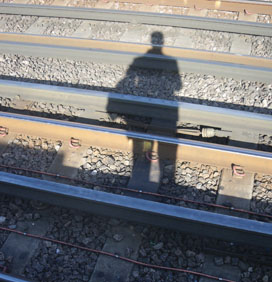Associate Professor Lisa Marzano of Middlesex University has been named one of the UK’s Lifesavers – the top 100 individuals or groups based in universities whose work is saving lives and making a life-changing difference to our health and wellbeing.
They have been named for the first time as part of Universities UK’s MadeAtUni campaign, which brings to life the impact of universities on everyday lives. Her research aims to develop a better understanding of how to support people in crisis and prevent suicide attempts.
She is appealing to the public to take part in an online survey to help her investigate how bystanders react when they come into contact with people on the railways and other public locations who are in distress and/or suicidal. The research team is particularly keen to hear from people who have experienced emotional distress and those who have stepped in to help, or wanted to, but did not know what to do.
The research was commissioned by the Samaritans on behalf of the rail industry as part of their suicide reduction and prevention work. There is around one suicide on Britain’s railways every 30 hours. Marzano’s previous research looked at what influences and deters people from taking their lives on railways. It was part of the Samaritans’ and rail sector’s ‘Small Talk Saves Lives’ campaign urging commuters to start a conversation with a person in distress, to interrupt their suicidal thoughts.
Marzano said: “It’s fantastic that our work is being recognised in this way. Suicide is preventable, and we can all play a role in that. Our previous research suggested that a simple conversation can help save someone’s life. Indeed, for every life lost on Britain’s railways, at least six appear to be saved by those around them.
“We’re now going a step further and want to find out why some people intervene, what prevents others from doing so, and, above all, what makes for a safe, effective, ‘life-saving’ intervention. When we analyse our survey results we’ll aim to produce a guide to help commuters and the general public know what to do in a crisis situation. In order to do this we need as many people as possible to get involved. It’s really important that we get responses from all 16-plus age groups and from across the UK to ensure our research reflects a wide range of experiences.”
All responses are anonymous and confidential.
Ian Stevens MBE, Rail Industry Spokesman for Suicide Prevention, added: “The railway is at the heart of most communities in this country and knowing how suicide impacts on them, it makes sense for the industry to contribute to a better understanding of how they can be prevented and how those in crisis can be supported. Those in the railway community suffer too every time a fatality occurs on the network. For example, train drivers become traumatised and some never return to work as a result of their experiences. For their sake as well, research of this nature is important to help relieve the anxiety many have when they enter a driving cab and wonder whether they’ll return home in the same state of mind as when they left.”
Samaritans point out that a simple question can be enough to interrupt suicidal thoughts and save a life, as brought out in the Small Talk Saves Lives campaign.










